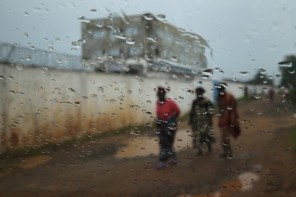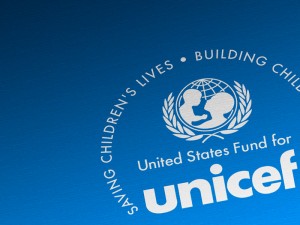One more thing I want to pull up from the comments on my Cote d’Ivoire post, from Rebecca:
On the streets here, especially during the day, it seems almost normal. Tense, but normal. The radar traffic cops are back to writing speeding tickets even. I can freely travel all over the city without problem, and the streets are full of people every day. We can’t forget that while Ouattara may have “won” the elections (and I believe the truth of this will never actually be known considering that EVERY monitoring report cited intimidation, fraud and irregularities from BOTH sides), nearly half the population did NOT want him in power, especially those in Abidjan. It is hardly the entire voice of the Ivorian people standing united behind Ouattara, the country is clearly divided, as it has been for more than a decade….
[T]he three districts I visited within Abidjan tonight (including one heavily pro-Ouattara neighbourhood) were all out in full blown party-mode with music blaring and fireworks and drunken antics this evening for the New Year celebration well into the night….
Clearly things are not stable in Abidjan. But Rebecca reminds us that they’re also not catastrophic.
I often struggle to explain to people at home the simultaneity of conflict — here intoned like Walter Cronkite — and everyday life. There’s a whole social science vocabulary that gropes to distinguish the kind of conflict where people also go shopping at the market or sing in church or visit friends, even as the rest of us read stories about mass rapes, rebel ambushes, or other atrocities. (Usually, I don’t think it helps, but that’s the nature of abstraction, which is what social science lingo does. Its rigor and its clarity comes at a cost. (Check out the guy at the end of this story, who tells a statistician, “I’m in your graph. The peak, right there, that’s where I was. I could feel that wave.”)
Societies in conflict are not static; atrocities are not friezes. There’s a reason anyone who’s been to Congo comes home and gushes about how “normal” things seem. Because something happens in the American imagination when we say “war” — or when we combine “war” and “Africa”? I’m not sure — that empties our mental pictures of the details that make us human.
Often, journalism abets rather than corrects that problem. Have you seen that story headlined, “Women in Congo go to market, laugh with friends, despite the 62 stories you saw this year about Rape in Congo”? Me either.
Another problem journalism abets, if it isn’t careful, is the good guy/bad guy myth. Rebecca mentioned in comments that she’s tired of seeing internationally recognized winner Ouattra lauded as the “savior” to internationally rejected, we’d-like-to-oust-him-but-won’t-actually-do-it contender Gbagbo.
I’ve reported from quite a few places where the international community quietly sanctions one leader to the detriment of the security of the state — in recent discussions about Burundi with some UN types, I sounded rather like Rebecca & Thierry. Journalism often follows suit — not necessarily because journalists independently arrive at the same conclusions, but because journalism (in the American model, anyway) teaches journalists that they have no independent source of authority, and so their own authority is earned by interviewing people with authority. That “authority” is loosely defined — a refugee is an ‘authority’ on being a refugee; a man on the street in Abidjan is an ‘authority’ on what the mood of Abidjan is. But journalism often privileges institutional authority, and that can often end up reinforcing the political battle, rather than helping to understand or illuminate what’s going on.



That’s the difficult things many people in North America don’t understand: just because a country is in conflict or war, does not mean that everywhere is chaotic. People often go about their regular routines, or modify them slightly to get around the latest shortcoming. But they still live.
I’ve gotten soo many calls and emails from worried friends and family back home who are constantly fearing for my life and every time they ask me questions about what it’s like– I always tell them it’s a lot more boring than you’d expect!
Jina, I loved your Côte d’Ivoire post and was rather dismayed to see Rebecca and Thierry pull the “we know Côte d’Ivoire better than you do” card. I too lived in Côte d’Ivoire for several years – until early 2010 – and I have been calling friends and former colleagues across the political spectrum there almost daily. Your analysis seems really quite astute to me.
There are so many clear factual problems in the responses to your post that I just don’t even know where to start, but I see that you, Pauline, and Martin are continuing the dialogue in a constructive way. Du courage. Keep it up!
Thanks, Mark. I appreciate your kind words and your own ground-based impression. Alas, I see expats in Africa do this to each other all the time — people in Rwanda sometimes have this argument by the week. I’m really grateful for Rebecca’s ground-eye view. I also think it’s true that the word genocide freaks people out, and for the sake of productive conversation, it’s probably best to talk about all the same things but under a different title. But even though I’ve never lived there, I do see risk… Here’s hoping it doesn’t become obvious.
I really wish you would start Mark. I have personally surveyed hundreds of people here on their experiences of violence since the elections have happened for my research, and have found a lot of things that aren’t being said in most mainstream media. I can hardly defend what I have written without any proofs or backing to how I am wrong if you are merely blanketing all I have said by claiming it as not factual. If I am proven wrong in my assessment, I will happily admit it, but I’d at least like to know where it is that I’m wrong and have a chance to respond.
I lived in NE DC, in a neighborhood know for violence. In summer 2008, we had an especially bad summer for shootings and the contrast between the place I lived – with my neighbors sitting on their porches and chatting – and the reporting by the Washington Post left me jaded about the media forever. (sample of writing: http://www.washingtonpost.com/wp-dyn/content/article/2008/07/19/AR2008071901679.html?sid=ST2009050802902)
I am an American with much experience in Kenya. Right now, I teach students (including journalism students) about doing research. I’m fascinated with this discussion because of the ingrained tendency of students to find and present information as it is convenient to them. In other words, so much lazy research. The irony of the information age is how easy it is to be lazy.
Right now, I’m using research on Kenya as a tool for students to push past the very impressions you all are describing. I am surprised (being inherently cynical) at how well my project works. I am interested in any methods I can find to elicit the stereotypes some of you speak of: life in a conflict region as life suspended, victims of violence or poverty as helpless, etc.
A rewarding byproduct of asking the students to think deeper about information they find is the way they naturally extend this same process to their own lives. Studying Kenya has brought many of them to rethink their own self-conceptions and decisions. I hope that as journalists you will remember your readers have a responsibility along with the writer.
I wish to thank everyone in this discussion for giving me much to think about.